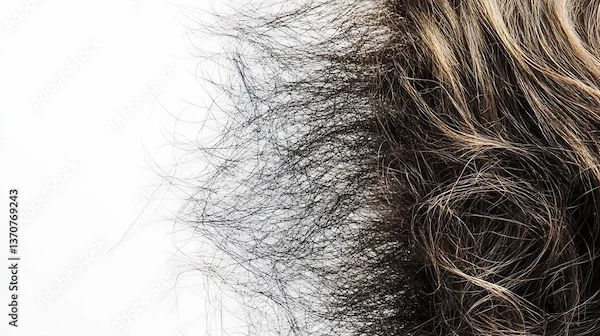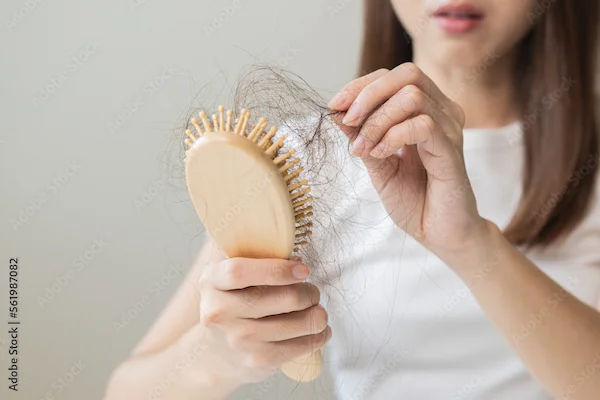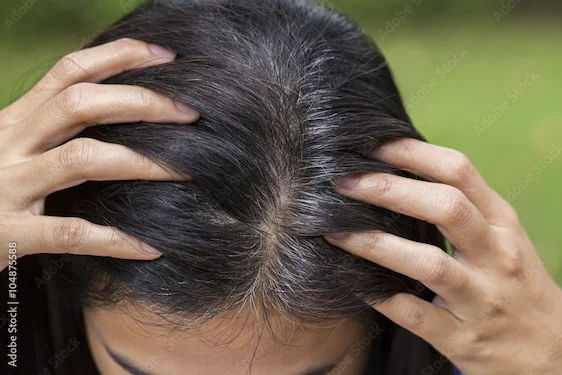How To Reduce Dryness Of Hair?
Discover effective ways to reduce hair dryness with natural remedies, hydrating treatments, and proper hair care tips. Learn how to restore moisture for soft, smooth, and healthy hair.

Written by Dr. Sonia Bhatt
Last updated on 3rd Jul, 2025

Introduction
Dry hair is a common concern for many individuals, and it can be frustrating when your hair feels rough, brittle, or dull. Fortunately, with the right hair care routine and a little attention, you can effectively reduce dryness and restore your hair's natural shine and softness. In this article, we'll explore the causes of dry hair, tips for reducing dryness, and actionable steps to help improve your hair's overall health.
What Causes Dry Hair?
Hair becomes dry when it lacks moisture and natural oils that help maintain its texture and elasticity. Various factors can contribute to this moisture imbalance, including:
Environmental Factors: Exposure to the sun, wind, and extreme temperatures can strip hair of its natural moisture. Dry air, especially during colder months, can exacerbate the issue.
Over-Washing and Harsh Products: Frequent washing can remove natural oils, while shampoos containing sulfates or alcohol can further dry out the hair.
Heat Styling: Tools like flat irons, curling irons, and blow dryers can cause significant damage by drying out the hair shaft. Excessive heat can weaken the hair, leading to breakage and dryness.
Chemical Treatments: Coloring, perming, and relaxing hair can strip it of moisture and cause it to become dry and fragile over time.
Poor Diet and Dehydration: A diet lacking in essential vitamins and minerals, such as omega-3 fatty acids, zinc, and biotin, can contribute to dry hair. Dehydration can also affect the moisture levels in your hair.
Underlying Health Conditions: Conditions like hypothyroidism, eczema, and psoriasis can contribute to scalp dryness and overall hair health.
Consult Top Dermatologist For More Information
Tips to Reduce Dryness and Restore Moisture to Your Hair
Luckily, there are many effective strategies you can implement to reduce the dryness of your hair and bring back its natural luster. Here are several effective tips to help you manage dryness and boost your hair health.
1. Use a Moisturizing Shampoo and Conditioner
The foundation of any good hair care routine starts with choosing the right shampoo and conditioner. Opt for sulfate-free shampoos, as sulfates can strip away natural oils, leaving your hair dry. Look for moisturizing formulas that contain ingredients like:
Glycerin: A humectant that draws moisture into the hair.
Aloe Vera: Known for its soothing and hydrating properties.
Natural Oils: Ingredients like coconut oil, argan oil, and jojoba oil help nourish and lock in moisture.
When selecting your conditioner, make sure it is rich in hydrating ingredients to help replenish lost moisture. Conditioner helps smooth the hair cuticle, reducing frizz and tangles while enhancing softness and shine.
2. Deep Condition Weekly
For extra moisture, incorporate a deep conditioning treatment into your routine at least once a week. Deep conditioners penetrate the hair shaft more deeply than regular conditioners, providing intense hydration.
Consider using masks that contain nourishing ingredients like:
Keratin: A protein that strengthens and repairs damaged hair.
Shea Butter: Known for its ability to restore moisture to dry, damaged hair.
Honey: A natural humectant that locks moisture in.
Leave the mask on for 10-20 minutes, allowing it to fully absorb before rinsing out. For added benefits, apply the treatment to damp hair and wrap it in a warm towel to create a mini steam treatment.
3. Limit Heat Styling and Protect Your Hair
Excessive use of heat styling tools is one of the primary causes of dry hair. If you must use heat, always apply a heat protectant spray beforehand to shield your hair from damage. Heat protectants form a barrier between your hair and the heat, reducing moisture loss and preventing brittleness.
Consider reducing the frequency of styling or opting for heatless styling techniques such as braiding your hair to create waves or using a microfiber towel to absorb moisture after washing, which can help minimize the need for blow-drying.
When using heat tools, always set them to the lowest effective temperature to minimize potential damage.
4. Incorporate Natural Oils into Your Routine
Natural oils are a game-changer for hydrating and nourishing dry hair. Some oils can penetrate the hair shaft, helping to replenish lost moisture and provide long-lasting hydration. Popular choices include:
Argan Oil: Rich in fatty acids and vitamin E, this oil is lightweight and excellent for hydration without weighing hair down.
Coconut Oil: Deeply moisturizing and capable of reducing protein loss, coconut oil is a great option for dry hair.
Jojoba Oil: Similar to the natural oils produced by the scalp, jojoba oil helps balance moisture levels and reduce dryness.
To use oils effectively, apply a small amount to damp hair or use it as a pre-shampoo treatment. Avoid using too much, as oils can build up and weigh down the hair if over-applied.
5. Avoid Hot Water When Washing Your Hair
Washing your hair with hot water may feel relaxing, but it can actually worsen dryness. Hot water strips away the natural oils that keep your hair hydrated. Instead, opt for lukewarm or cool water when washing and rinsing your hair.
Cool water helps to seal the hair cuticle, preventing moisture loss and promoting shine. If you prefer a warm shower, save the cool rinse for the final step.
6. Protect Your Hair While Sleeping
Your hair can become dry even when you’re sleeping, especially if you’re tossing and turning on cotton pillowcases, which can cause friction and lead to breakage. To protect your hair overnight:
Switch to a silk or satin pillowcase: These fabrics create less friction, reducing hair breakage and moisture loss.
Consider wearing a loose braid or hair wrap: A loose braid helps prevent tangles and reduces the risk of hair damage during sleep.
If you have long hair, you might also want to try protective hairstyles like braids or buns to keep your hair from rubbing against your pillow and absorbing moisture.
7. Hydrate Your Hair from the Inside Out
While external treatments are essential for dry hair, don’t forget the importance of internal hydration. Drink plenty of water throughout the day to keep your body (and your hair) hydrated. Aim for at least eight cups of water per day, and consider adding foods that promote hair health, such as:
Omega-3 fatty acids: Found in salmon, walnuts, and flaxseeds, omega-3s help nourish the scalp and improve hair texture.
Biotin-rich foods: Eggs, almonds, and sweet potatoes are rich in biotin, a vitamin that supports healthy hair growth and moisture retention.
Vitamin E: Spinach, avocados, and sunflower seeds are excellent sources of vitamin E, which helps improve circulation to the scalp and promotes healthy hair.
8. Trim Regularly
Regular trims are essential for keeping hair healthy and free from split ends. Split ends can make hair appear more dry and damaged, contributing to an overall lack of moisture. A trim every six to eight weeks helps remove damaged ends and maintain the overall health of your hair.
For More Tips Consult Top Dermatologist
Conclusion
Reducing hair dryness is entirely possible with the right approach and consistent care. By understanding the causes of dry hair and implementing these practical tips into your daily routine, you can restore moisture, improve texture, and promote overall hair health. Whether you’re dealing with heat damage, environmental stressors, or lack of hydration, these simple, effective steps will help you reclaim healthy, hydrated hair in no time. Remember that consistency is key, so stick to your routine, and your hair will thank you!
For More Tips Consult Top Dermatologist

Dr. K Chetana
Dermatologist
10 Years • MBBS, MD ( Dermatology)
Hyderabad
Apollo 24|7 Clinic, Hyderabad

Dr Usha B K
Dermatologist
4 Years • MBBS,MD (Dermatology, Venereology & Leprosy), DNB (Dermatology, Venereology & Leprosy), Fellowship in Trichology
Bangalore
Apollo 24|7 Clinic - Karnataka, Bangalore
(50+ Patients)

Dr. Hemalatha Naidu M
Dermatologist
5 Years • MBBS, MD (Dermatology)
Bangalore
Apollo 24|7 Clinic - Karnataka, Bangalore
(250+ Patients)

Dr. Jyotirmay Bharti
Dermatologist
15 Years • MBBS, DDV
Gurugram
SQUARE ROOTS- HAIR, SKIN AND LASER CLINIC, Gurugram
Dr. Kavitha Killaparthy
Dermatologist
23 Years • MBBS,DIPLOMA(DERMATOLOGY,VENEREOLOGY,LEPROSY)
Hyderabad
JDS Skin & Hair Clinic, Hyderabad
Consult Top Dermatologist For More Information

Dr. K Chetana
Dermatologist
10 Years • MBBS, MD ( Dermatology)
Hyderabad
Apollo 24|7 Clinic, Hyderabad

Dr Usha B K
Dermatologist
4 Years • MBBS,MD (Dermatology, Venereology & Leprosy), DNB (Dermatology, Venereology & Leprosy), Fellowship in Trichology
Bangalore
Apollo 24|7 Clinic - Karnataka, Bangalore
(50+ Patients)

Dr. Hemalatha Naidu M
Dermatologist
5 Years • MBBS, MD (Dermatology)
Bangalore
Apollo 24|7 Clinic - Karnataka, Bangalore
(250+ Patients)

Dr. Jyotirmay Bharti
Dermatologist
15 Years • MBBS, DDV
Gurugram
SQUARE ROOTS- HAIR, SKIN AND LASER CLINIC, Gurugram
Dr. Kavitha Killaparthy
Dermatologist
23 Years • MBBS,DIPLOMA(DERMATOLOGY,VENEREOLOGY,LEPROSY)
Hyderabad
JDS Skin & Hair Clinic, Hyderabad



